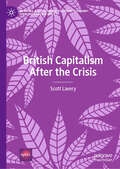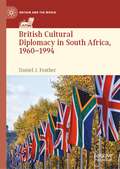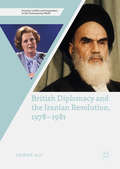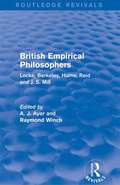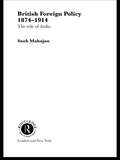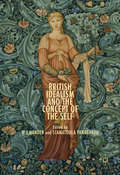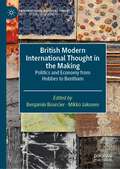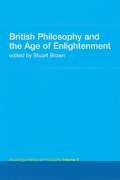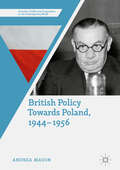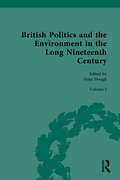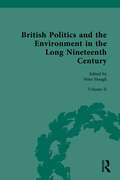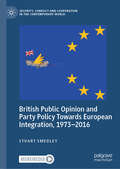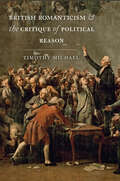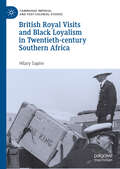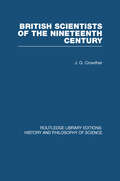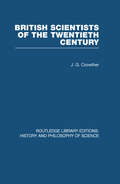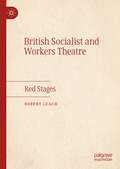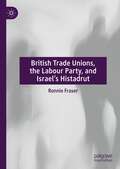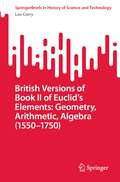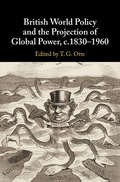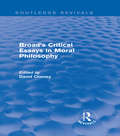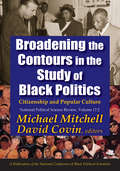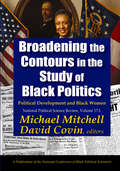- Table View
- List View
British Antifascism and the Holocaust, 1945–79 (Routledge Studies in Fascism and the Far Right)
by Joshua CohenBritish Antifascism and the Holocaust, 1945–79 explores the extent to which the Holocaust has shaped British antifascism. The author tests assertions of an uncomplicated relationship between Holocaust memory and the imperative to resist postwar fascist revivals. For those with a scholarly interest in how antifascists confront their opponents, it is essential to understand whether the Holocaust has always been seen as an insurmountable barrier against fascism: is the idea of the genocide’s constant antifascist ‘use’ actually a dangerous assumption and, if so, what are the implications of this for ‘Antifa’ as its battle with the contemporary far right unfolds? This book provides a political and structural history of the Holocaust’s relationship to antifascist organisations and questions whether networks of solidarity formed around Holocaust memory, including analysing the impact of the genocide in Jewish antifascists’ motivations and rhetoric. It also assesses the Holocaust’s political capital in wider antifascism and connected anti-racism, including in defence of the Black and Asian communities increasingly victimised by fascists over the postwar period. This book will appeal to scholars and students with interests in antifascism, fascism, racism, and Jewish and left-wing history in Britain, and how these intersect with Holocaust consciousness.
British Capitalism After the Crisis (Building a Sustainable Political Economy: SPERI Research & Policy)
by Scott LaveryThe 2008 financial crisis rocked British capitalism to its foundations. More than a decade after the crash, the country is still dealing with its consequences. This book explores the extent to which British capitalism has been reconfigured in this tumultuous period. Advancing an in-depth analysis of the political economy of New Labour, the Coalition and the period after Brexit, the book argues that deep structural weaknesses have been re-embedded within British capitalism. The Coalition promised to eliminate the deficit in one parliament and to ‘rebalance’ the British economy. It did neither. Instead, real wages slumped, uneven development intensified and productivity stagnated. An era of volatile post-crisis politics - exemplified by Brexit, the May government and the rise of Corbyn - emerged in this context, threatening the foundations of the old order. This book is required reading for students and scholars interested in the fractious political economy of British capitalism after the crisis.
British Cultural Diplomacy in South Africa, 1960–1994 (Britain and the World)
by Daniel J. FeatherThis book analyses the British government’s use of cultural diplomacy in South Africa from 1960 to 1994. Previously, scholarship on UK-South African relations has focussed mainly on political, economic, or military links; this book makes an important and original intervention by emphasising how the British government sought to use cultural ties as part of its diplomacy in South Africa. The book also highlights the controversy these links generated owing to broader international efforts to ostracise South Africa owing to the racist apartheid system in the country at the time. By examining British policy towards educational exchanges, performing arts tours, radio and television broadcasts, and sporting contact, this book provides a dynamic case study from which to analyse Britain’s use of cultural diplomacy during a period of relative decline, while also adding a new layer to the well-established literature on the UK-South African special relationship.
British Diplomacy and the Iranian Revolution, 1978-1981 (Security, Conflict and Cooperation in the Contemporary World)
by Luman AliThis book investigates how British diplomats in Tehran and London reacted to the overthrow of the Shah and the creation of an Islamic Republic in Iran, which had previously been a major political and commercial partner for London in the Middle East. Making substantial use of recently declassified archival material, the book explores the role of a significant diplomatic institution – the resident embassy – and the impact of revolutions on diplomatic relations. It evaluates the performance of those charged with British diplomacy during the Iranian Revolution, as Britain’s position fell from favour under the post-revolutionary regime. Examining the views of key diplomatic personnel at the Foreign and Commonwealth Office and British ministers, this study seeks to explain how British policy towards Iran was shaped and the means of diplomacy employed. In charting the evolution of Britain’s diplomatic relationship with Iran during this period, a number of factors are considered, including historical experience, geography, economics, world politics and domestic concerns. It also highlights the impact of events within the Iranian domestic political scene which were beyond London’s control but which shaped British policy significantly.
British Empirical Philosophers: Locke, Berkeley, Hume, Reid and J. S. Mill. [An anthology] (Routledge Revivals)
by A. J. Ayer and Raymond WinchFirst published in 1952, British Empirical Philosophers is a comprehensive picture of one of the most important movements in the history of philosophic thought. In his introduction, Professor A. J. Ayer distinguishes the main problems of empiricism and gives a critical account of the ways in which the philosophers whose writings are included in this volume attempted to solve them. Editors Ayer and Raymond Winch bring together an authoritative abridgement of John Locke’s Essay Concerning Human Understanding; Bishop George Berkeley’s Principles of Human Knowledge; almost the entire first book of David Hume’s Treatise Concerning Human Nature; and extracts from Thomas Reid’s Essay on the Intellectual Powers of Man and John Stuart Mill’s Examination of Sir William Hamilton’s Philosophy.
British Foreign Policy 1874-1914: The Role of India (Routledge Studies in Modern European History)
by Sneh MahajanA challenging analysis of British Foreign Policy is provided at a time when Britain possessed the biggest Empire that humankind has ever known. In this Empire India had a unique position, comprising 97 per cent of Britain's Asiatic Empire. All British statesmen deemed it essential to maintain their hold over India whatever the risk or cost of doing so.This work focuses on aspects that have been hitherto marginalized. It also contributes to debates surrounding the origins of the First World War, the multipolar diplomacy of the late nineteenth century, and the nature of imperial connections.
British Idealism and the Concept of the Self
by W. J. Mander Stamatoula PanagakouThis book reassesses the origins, development and legacy of the philosophy of the British idealists, demonstrating the enduring relevance of their thought for the modern discipline. This body of work coheres around the single unifying theme of the self - a concept of central importance to the idealist school. Particular attention is also paid to the many connections that hold between various philosophers and branches of philosophy, as well as creating a set of continuously running dialogues between contributing authors. Readers will discover a comprehensive, stimulating and sharply focused panorama of British idealist thought, which will be useful to philosophers, historians of ideas, political and social theorists, psychologists, and policy-makers who wish to gain a deeper understanding of the citizen as a self.
British Modern International Thought in the Making: Politics and Economy from Hobbes to Bentham (International Political Theory)
by Benjamin Bourcier Mikko JakonenThis book articulates international political theory in dialogue with economics on several questions. It asks: how has modern international theory been adjusted and nourished by economic ideas, theories and practices? How far has the distinctive contribution of some theorists to international theory been informed by their views on economy? What has been the impact of the theory of the state for economic and international theory? What sort of economic thinking has led to revise the debates constitutive for the modern international realm? How have economic debates been rhetorically connected to political debates in the field of international relations?
British Philosophy and the Age of Enlightenment: Routledge History of Philosophy Volume 5 (Routledge History of Philosophy #Vol. 5)
by Stuart BrownThis fifth volume covers many of the most important philosophers and movements of the nineteenth century, including utilitarianism, positivism and pragmatism.
British Policy Towards Poland, 1944–1956 (Security, Conflict and Cooperation in the Contemporary World)
by Andrea MasonThis book examines the outcome of the British commitment to reconstitute a sovereign Polish state and establish a democratic Polish government after the Second World War. It analyses the wartime origins of Churchill’s commitment to Poland, and assesses the reasons for the collapse of British efforts to support the leader of the Polish opposition, Stanisław Mikołajczyk, in countering the attempt by the Polish communist party to establish one-party rule after the war. This examination of Anglo-Polish relations is set within the broader context of emerging early Cold War tensions. It addresses the shift in British foreign policy after 1945 towards the US, the Soviet Union and Europe, as British leaders and policymakers adjusted both to the new post-war international circumstances, and to the domestic constraints which increasingly limited British policy options. This work analyses the reasons for Ernest Bevin’s decision to disengage from Poland, helping to advance the debate on the larger question of Bevin’s vision of Britain’s place within the newly reconfigured international system. The final chapter surveys British policy towards Poland from the period of Sovietisation in the late 1940s up to the October 1956 revolution, arguing that Poland’s process of liberalisation in the mid-1950s served as the catalyst for limited British reengagement in Eastern Europe.
British Politics and the Environment in the Long Nineteenth Century: Volume I - Discovering Nature and Romanticizing Nature
by Peter HoughThis volume of archival source material chronicles British environmental politics between 1789 and 1914. This text examines scientific discoveries during this period and the result of these findings on the political environment, bringing the publics attention to public health issues such as acid rain and river pollution. Accompanied by extensive editorial commentary, this collection will be of great interest to students of environmental and political history.
British Politics and the Environment in the Long Nineteenth Century: Volume II - Regulating Nature and Conquering Nature
by Peter HoughThis collection of archival source material chronicles British environmental politics between 1789 and 1914. This text examines the ways in which environmental issues were managed artistically and socially, as well as politically. Accompanied by extensive editorial commentary, this collection will be of great interest to students of environmental and political history.
British Public Opinion and Party Policy Towards European Integration, 1973–2016 (Security, Conflict and Cooperation in the Contemporary World)
by Stuart SmedleyThis book provides the first detailed historical account of British public opinion and party policy towards European integration from 1973 (the year in which the UK joined the European Community) to 2016 (the year in which the UK voted to leave the European Union). It takes a thematic approach towards this subject, exploring party policy and public opinion towards significant developments in the European integration process during the period covered. These include moves towards deeper and flexible integration, economic and monetary union, the Single Market, enlargement, and foreign and defence policy cooperation. The author assesses the nature of British public opinion towards these developments - some of which Britain's government and main political parties supported, and others which they opposed - and analyses the extent to which party policies reflected public opinion.
British Romanticism and the Critique of Political Reason
by Timothy MichaelRomantic writers responded to the challenges of reform and revolution by rethinking the scope of political reason.What role should reason play in the creation of a free and just society? Can we claim to know anything in a field as complex as politics? And how can the cause of political rationalism be advanced when it is seen as having blood on its hands? These are the questions that occupied a group of British poets, philosophers, and polemicists in the years following the French Revolution.Timothy Michael argues that much literature of the period is a trial, or a critique, of reason in its political capacities and a test of the kinds of knowledge available to it. For Wordsworth, Coleridge, Shelley, Burke, Wollstonecraft, and Godwin, the historical sequence of revolution, counter-revolution, and terror in France—and radicalism and repression in Britain—occasioned a dramatic reassessment of how best to advance the project of enlightenment. The political thought of these figures must be understood, Michael contends, in the context of their philosophical thought. Major poems of the period, including The Prelude, The Excursion, and Prometheus Unbound, are in this reading an adjudication of competing political and epistemological claims. This book bridges for the first time two traditional pillars of Romantic studies: the period’s politics and its theories of the mind and knowledge. Combining literary and intellectual history, it provides an account of British Romanticism in which high rhetoric, political prose, poetry, and poetics converge in a discourse of enlightenment and emancipation.
British Royal Visits and Black Loyalism in Twentieth-century Southern Africa (Cambridge Imperial and Post-Colonial Studies)
by Hilary SapireExploring the entwined histories of British royal visits to Southern Africa in the twentieth century, this book analyses the clashing voices of dissent and cheering crowds that accompanied royal tours, providing insight into the shifting nature of ‘Black loyalism.’ Originating in the Indigenous empire loyalism of eighteenth-century Canada, Black loyalism encompassed loyalty to the British crown and a shared ideology of ‘rights and ‘entitlements,’ which positioned the crown as a source of protection against white settler rapacity, colonial violence, and racial oppression. However, expressions of monarchical devotion were often double-edged and addressed the fundamental contradiction of a crown that was both the source of rights and complicit in colonial conquest, appropriation, and misrule. It was on royal occasions such as jubilees, coronation celebrations, and especially royal visits, when the sovereign was literally amongst their more distant subjects, that loyalist sentiment was rekindled, reinvented, and made directly relevant to the concerns of the day. By analysing change and continuity in Black perspectives towards both the British and Indigenous African monarchy during these visits, this book offers a fruitful way into examining an array of Black Southern African discourses on governance, political values, and cultural identities across the region. It argues that the refashioning of British imperial monarchy in the twentieth century was profoundly shaped by African initiatives and re-imaginings, and provides valuable reading for those researching imperialism, popular attitudes to the British monarchy in the twentieth century, and the diverse politics and identities of southern Africa.
British Scientists of the Nineteenth Century
by J G CrowtherJ G Crowther has chosen five of the greatest scientists of the nineteenth century – Davy, Faraday, Clerk-Maxwell, Joule, Lord Kelvin and examines every aspect of their lives and work.
British Scientists of the Twentieth Century (Routledge Library Editions: History & Philosophy of Science)
by J G CrowtherFollowing on from British Scientists of the Nineteenth Century, this volume covers six eminent British scientists whose work and personality have not receded into the same depth of perspective as their predecessors of the Nineteenth Century, but the tremendous changes following the two world wars have already cut them off sharply from this generation.
British Socialist and Workers Theatre: Red Stages
by Robert LeachThis book provides an overview of the inception, development and achievements of British socialist and workers theatre – a feat which has not been attempted before. It explores the connections between politics and culture (specifically theatre) and between political theory and cultural (theatrical) expression. The book is organized chronologically and uncovers much in labour and theatre history which is in danger of being lost. It can also be seen as a way into different moments in its subject’s story (e.g. post-Ibsen naturalism; agitprop theatre; ‘fringe’ theatre of the 1970s) and the relationship of such forms to specific political events and ideas at specific points in history.
British Trade Unions, the Labour Party, and Israel’s Histadrut
by Ronnie FraserThis book explores the British Labour Party and the trade unions and how their relationship with the Jews of Palestine and Israel has evolved over the past one hundred years. It also reflects the changing attitudes of the Labour Party and the unions towards the persecution of the Jews, a Jewish homeland in Palestine, Israel and antisemitism. An in-depth examination of critical events in European and Middle East history reveals the links between British unions and their Israeli union counterpart, the Histadrut (General Federation of Labour), and sets out the circumstances in which the unions went from backing the Labour Party’s 1917 war aims declaration, which called for the establishment of a Jewish homeland in Palestine, through to the present day, which sees the unions promoting campaigns for boycotts and sanctions against the State of Israel.
British Versions of Book II of Euclid’s Elements: Geometry, Arithmetic, Algebra (SpringerBriefs in History of Science and Technology)
by Leo CorryThis book discusses the changing conceptions about the relationship between geometry and arithmetic within the Euclidean tradition that developed in the British context of the sixteenth and seventeenth century. Its focus is on Book II of the Elements and the ways in which algebraic symbolism and methods, especially as recently introduced by François Viète and his followers, took center stage as mediators between the two realms, and thus offered new avenues to work out that relationship in idiosyncratic ways not found in earlier editions of the Euclidean text. Texts examined include Robert Recorde's Pathway to Knowledge (1551), Henry Billingsley’s first English translation of the Elements (1570), Clavis Mathematicae by William Oughtred and Artis Analyticae Praxis by Thomas Harriot (both published in 1631), Isaac Barrow’s versions of the Elements (1660), and John Wallis Treatise of Algebra (1685), and the English translations of Claude Dechales’ French Euclidean Elements (1685). This book offers a completely new perspective of the topic and analyzes mostly unexplored material. It will be of interest to historians of mathematics, mathematicians with an interest in history and historians of renaissance science in general.
British World Policy and the Projection of Global Power, c.1830–1960
by T. G. OtteA fundamental truth about British power in the nineteenth century and beyond was that Britain was a global power. Her international position rested on her global economic, naval and political presence; and her foreign policy operated on a global scale. This volume throws into sharp relief the material elements of British power, but also its less tangible components, from Britain's global network of naval bases to the vast range of intersecting commercial, financial and intelligence relationships, which reinforced the country's political power. Leading historians reshape the scholarly debate surrounding the nature of British global power at a crucial period of transformation in international politics, and in so doing they deepen our understanding of the global nature of British power, the shifts in the international landscape from the high Victorian period to the 1960s, and the changing nature of the British state in this period.
Broad's Critical Essays in Moral Philosophy (Routledge Revivals)
by David CheneyThe ideas of C. D. Broad have affected the work of moral philosophers throughout the twentieth century to the present day. First published in 1971, this edited volume contains Broad’s best essays on the philosophical problems of Ethics, mostly written and published between 1914 and 1964. Among the essays are Broad’s important critiques of G. E. Moore’s ethical theory, his lecture entitled ‘Determinism, Indeterminism and Libertarianism’, and other pieces discussing topics as broad as Conscience, Egoism and Free Will. This reissue serves as an important companion to Broad’s other works, a number of which have also been reissued within the Routledge Library Editions series, and will be invaluable to students interested in Broad’s theories and twentieth-century philosophical thought.
Broadcasting in Japan: Challenges and Opportunities (Advances in Information and Communication Research #5)
by Hitoshi Mitomo Mikio KimuraThis book provides an analysis of the various challenges and opportunities facing the Japanese broadcasting industry. It is the first book in English that explores how Japanese broadcasting, especially commercial broadcasting, fulfills its social mission under the threat of the increased popularity of Internet-based media services as it reexamines the role and nature of broadcasting. During a series of disasters and the spread of the new coronavirus in Japan, while varied media connected people and supported socio-economic activities, broadcasting continued to be the most trusted. However, as Internet media attract increasing attention, the trend in broadcast viewership is downward. Commercial broadcasting, in particular, will be strongly affected by that trend and the impact of the shrinking population. Recognizing that such dramatic technological and environmental changes are under way, in addition to the eleven researchers participating in the visiting researcher committee at the Research Institute of the Japan Commercial Broadcasters Association (JBA), four research collaborators and the secretariat (director of the JBA) have contributed to this book. They have taken up issues related to challenges and opportunities for the broadcasting industry based on their respective areas of awareness of the problems, including policies for broadcasting, fake news, disaster responses, viewer trust in television programs, competition with Internet-based services, and the business model for broadcasting.
Broadening the Contours in the Study of Black Politics: Citizenship and Popular Culture (National Political Science Review Ser.)
by Michael MitchellBroadening the Contours in the Study of Black Politics, volume 17 of the National Political Science Review (NPSR), is divided thematically into two books, available separately or as a set. The first concentrates on the institutional aspects of Black politics. The second book addresses various dimensions of social capital that constitute the fundamental building blocks of Black politics. Each contains peer-reviewed articles, a symposium section, and book reviews, as well as other featured sections.Together, these books build on the previous NPSR volume, Black Women in Politics. The symposium in Volume 17:1 examines the struggle of Black women, both in the political science discipline and in getting their work published. In the symposium section of Volume 17:2, members of the National Conference of Black Political Scientists carry on a revealing conversation about the dilemmas of professional life for Black women in political science.The set also contains a section called "Trends," which offers data to use as starting points for discussions in teaching, on professional panels, or in the mass media, regarding the new versions of the Voting Rights Act after the Shelby County v. Holder decision of 2013. Both volumes 17:1 and 17:2 contain rigorously vetted articles on significant themes in the study of Black politics. This set represents the most recent offering in the distinguished National Political Science Review series.
Broadening the Contours in the Study of Black Politics: Political Development and Black Women (National Political Science Review Ser.)
by Aaron WildavskyBroadening the Contours in the Study of Black Politics, volume 17 of the National Political Science Review (NPSR), is divided thematically into two books, available separately or as a set. The first concentrates on the institutional aspects of Black politics. The second book addresses various dimensions of social capital that constitute the fundamental building blocks of Black politics. Each contains peer-reviewed articles, a symposium section, and book reviews, as well as other featured sections.Together, these books build on the previous NPSR volume, Black Women in Politics. The symposium in Volume 17:1 examines the struggle of Black women, both in the political science discipline and in getting their work published. In the symposium section of Volume 17:2, members of the National Conference of Black Political Scientists carry on a revealing conversation about the dilemmas of professional life for Black women in political science.The set also contains a section called "Trends," which offers data to use as starting points for discussions in teaching, on professional panels, or in the mass media, regarding the new versions of the Voting Rights Act after the Shelby County v. Holder decision of 2013. Both volumes 17:1 and 17:2 contain rigorously vetted articles on significant themes in the study of Black politics. This set represents the most recent offering in the distinguished National Political Science Review series.

